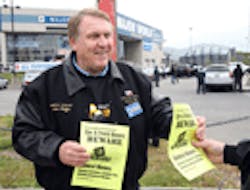The International Brotherhood of Teamsters is launching a six-week national campaign against OEMs such as General Motors and Chryslers to protest reported efforts to “demand dramatic and unsustainable cost cuts from Teamster-represented car haul companies,” the union said.
“We believe the automotive OEMs are trying to run the unionized car haulers out of business,” Fred Zuckerman, the Teamster’s car haul division director, told FleetOwner. “The OEMs are forcing revenue and volume cuts on car haul carriers that are unsustainable; we know that [these carriers] are losing money. It’s getting to the point where none of these carriers can survive.”
“Taxpayers have already financed GM and Chrysler to the tune of more than $60 billion in bailout money and billions more in the Cash for Clunkers program,” said Jim Hoffa, the Teamster’s general president. “We want to remind these automakers that their taxpayer bailouts were intended to help save American jobs. Instead, they are out to destroy an industry that pays good wages and benefits at a time when we should be protecting and creating more of these kinds of jobs in this country.”
Zuckerman said the immediate concern is Chrysler, which shifted 28% of its car hauling business away from two major unionized carriers on Oct. 1 -- Atlanta-based Allied Systems Holdings and Illinois-based Cassens Transport Co. He claimed that shift alone would cost 400 Teamster car hauling jobs alone, but Chrysler countered that the change will only eliminate the jobs of 77 Teamster drivers in Michigan.
Chrysler also claims in a fact sheet distributed on Capitol Hill that shifting car transport away from unionized carriers would help it slice $31 million from its $111 million in annual hauling over the next three years, while also improving transit time by an average of 23%.
The gloomier long-term employment picture is what concerns the Teamsters the most, for although their rolls list 8,000 car hauling drivers, only 4,700 to 4,800 are fully employed today, said Zuckerman. Over the past year, more than 1,000 jobs have been shed in the car hauling business, he added, despite wage cuts. Teamster drivers at Allied, for example, agreed to a 17.5% wage cut last year.
GM is also a target in the Teamster’s protest effort because the union believes the automaker is planning to push for rate cuts when its car hauling business comes up from renewal on Feb. 1 next year.
The union also noted that car buyers are still largely being charged a mandatory “destination fee” of more than $900 for their vehicles; a dollar figure the union claims now has no relation to the actual cost of transporting a vehicle.
“Even if the automakers succeed in making these outrageous cuts, the cost savings will be very small," noted Tom Keegel, noted the Teamsters’ general secretary-treasurer. “Auto transport represents just $120 per vehicle. And any cost savings will not be passed on to dealers or consumers.”
Zuckerman noted that the restructuring of the auto industry required shared sacrifice not just of the companies, but also the workers and suppliers, with experienced Teamster car haul drivers taking steep wage cuts to ensure the long-term viability of the auto industry and the union carrier companies.
Now, the cuts automakers are currently demanding will bankrupt the union carriers and eliminate good middle-class jobs, Zuckerman said. “Car hauling is a very capital intensive industry,” he explained. “The type of equipment required to safety transport automobiles is very expensive, with just one car-hauling tractor-trailer costing anywhere from $200,000 to $250,000, depending on the technology. And cars are the only things they can haul with these rigs – they can’t perform any other business with them.”
About the Author
Sean Kilcarr
Editor in Chief
Sean Kilcarr is a former longtime FleetOwner senior editor who wrote for the publication from 2000 to 2018. He served as editor-in-chief from 2017 to 2018.
